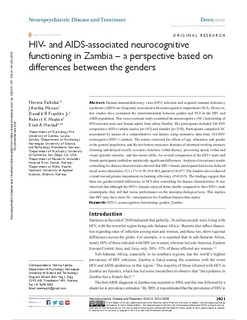| dc.contributor.author | Kabuba, Norma Namasiku Zewelanji | |
| dc.contributor.author | Menon, J. A. | |
| dc.contributor.author | Franklin, D.R. jr. | |
| dc.contributor.author | Heaton, R. K. | |
| dc.contributor.author | Hestad, Knut | |
| dc.date.accessioned | 2016-10-03T13:15:52Z | |
| dc.date.accessioned | 2016-11-01T11:34:44Z | |
| dc.date.available | 2016-10-03T13:15:52Z | |
| dc.date.available | 2016-11-01T11:34:44Z | |
| dc.date.issued | 2016 | |
| dc.identifier.citation | Neuropsychiatric Disease and Treatment 2016 | |
| dc.identifier.issn | 1178-2021 | |
| dc.identifier.uri | http://hdl.handle.net/11250/2418535 | |
| dc.description | This is an Open Access article licensed under the Creative Commons Attribution License 3.0 (CC BY 3.0) and originally published in Neuropsychiatric Disease and Treatment. You can access the article by following this link: http://dx.doi.org10.2147/NDT.S105481 | |
| dc.description | Dette er en vitenskapelig, fagfellevurdert artikkel som opprinnelig ble publisert i Neuropsychiatric Disease and Treatment. Artikkelen er publisert under lisensen Creative Commons Attribution License 3.0 (CC BY 3.0). Du kan også få tilgang til artikkelen ved å følge denne lenken: http://dx.doi.org10.2147/NDT.S105481 | |
| dc.description.abstract | Human immunodeficiency virus (HIV) infection and acquired immune deficiency syndrome (AIDS) are frequently associated with neurocognitive impairment (NCI). However, few studies have examined the interrelationship between gender and NCI in the HIV and AIDS population. This cross-sectional study examined the neurocognitive (NC) functioning of HIV-infected male and female adults from urban Zambia. The participants included 266 HIV seropositive (HIV+) adults (males [n=107] and females [n=159]). Participants completed NC assessment by means of a comprehensive test battery using normative data from 324 HIVseronegative (HIV−) controls. The norms corrected for effects of age, education, and gender in the general population, and the test battery measures domains of attention/working memory (learning and delayed recall), executive function, verbal fluency, processing speed, verbal and visual episodic memory, and fine motor skills. An overall comparison of the HIV+ male and female participants yielded no statistically significant differences. Analysis of covariance results controlling for disease characteristics showed that HIV+ female participants had worse delayed recall scores than males, F(1,117) =9.70, P=0.002, partial η2 =0.077. The females also evidenced a trend toward greater impairment on learning efficiency (P=0.015). The findings suggest that there are gender-related differences in NCI after controlling for disease characteristics. It was observed that although the HIV+ females enjoyed better health compared to their HIV+ male counterparts, they still had worse performance on the neuropsychological tests. This implies that HIV may have more NC consequences for Zambian females than males | |
| dc.language.iso | eng | |
| dc.title | HIV- and AIDS-associated neurocognitive functioning in Zambia - a perspective based on differences between the genders | |
| dc.type | Journal article | |
| dc.type | Peer reviewed | |
| dc.date.updated | 2016-10-03T13:15:52Z | |
| dc.identifier.doi | 10.2147/NDT.S105481 | |
| dc.identifier.cristin | 1388034 | |
